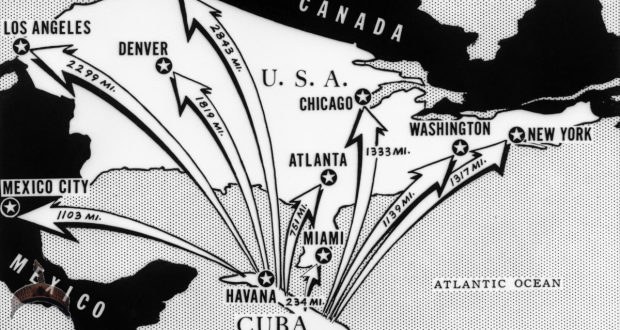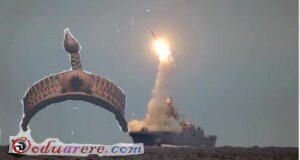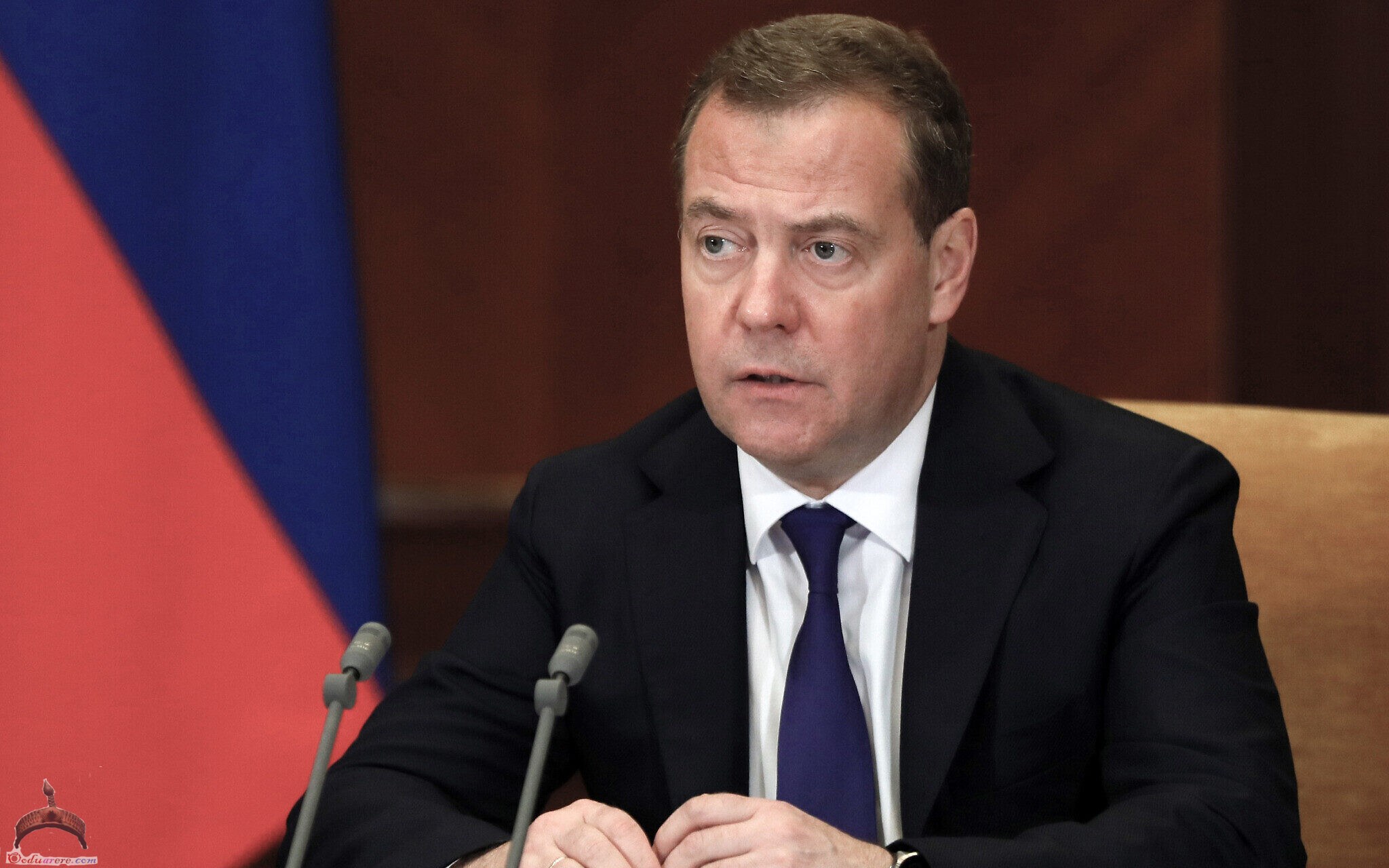by Observer R for the Ooduarere vis Saker Blog
BACKGROUND
In December 2021, Russia delivered two letters to the United States concerning the Security Architecture of Europe—commonly known as the “Not-Ultimatum.” The United States provided a written response to Russia in January 2022. This response was kept secret at the request of the United States. However, the Russian foreign minister announced that the response only covered secondary items and did not address the main points of NATO expansion and offensive missile placement. Russia had previously announced that if a satisfactory response was not received, then Russia would be forced to resort to unspecified “military-technical” measures. The great game among analysts is guessing the actual nature of those measures.
These guesses range all over the possibilities, from the idea that Russia is bluffing and will have to back down, to various shooting-war scenarios. A Russian high official mentioned that the outcome might be another Cuban Missile Crisis, so this factor is common thread in the analyses. Another common thread is that Russia might be planning to wind up the war in Syria by arranging to extend Syrian government control over the entire country. In other words, to get the Turks, Americans, Israelis, and other countries not invited by Syria, to pack up and go home. A third thread is the question of war in Ukraine, where the US is insisting that Russia is poised to invade, while the Ukraine government is trying to downplay the war fever. There are other possible “military-technical” measures that are less common in the analyses, as well as some rare multidimensional chess schemes.
CUBAN MISSILE CRISIS II
Many years ago, the US moved intermediate range missiles into Turkey and Italy, aimed at the Soviet Union. The Soviets did not appreciate this action, so they proceeded to move their similar missiles into Cuba. The result was a huge uproar and end-of-world hysteria, but the US quietly withdrew its missiles and the Soviets turned around and also took their missiles back home. The two countries learned their lesson and proceeded to negotiate arms-control agreements. Fast forward a half-century and the US decided to try the same maneuver again by moving weapons closer and closer to the Russian border while ditching many of the arms-control agreements. The Russians were not amused and suggested that Russia might move weapons closer to the US border in response. In addition, the president of Russia had some long discussions with the presidents of Cuba and Venezuela, which sparked more speculation that something was afoot. At the same time, elections in Nicaragua resulted in a president that the US disliked and led to some US sanctions. Some pundits recalled that there has long been a proposal for China to build a competitive canal across Nicaragua and that it would be natural for China to place military forces at both ends of the canal to protect it from any eventualities.
Analysts generally downplayed the idea of Russia building bases on land in Cuba, as it would take time, they would be sitting ducks, and the supply lines would be very long and unprotected. However, the US bases near Russian borders are in the same exposed position. So it would be more of a standoff and stalemate. The former president of Russia poured cold water on the idea of bases in Cuba or Venezuela. Many analysts thought that Russian navy ships with missiles would be a better way to locate near Cuba, where they could visit Cuban harbors. Another widely held idea among analysts was that Russian submarines off the US coasts in the Atlantic and the Pacific with exotic weapons would be enough to take care of things, so there was no need to get involved with Cuba or Venezuela.
UKRAINE THEATRE
The US, along with the UK and Poland, has been promoting the idea that Russia is building up forces along the Ukraine border in order to invade Ukraine and overthrow the government. The mainstream press has gone heavily into supporting this scenario, but recently things have come unstuck. The US president had a phone conversation with the Ukraine president and tried to convince him that a Russian invasion was imminent. The Ukraine president had a different take on it and claimed that invasion fears were overblown and the excitement was bad for business and the economy. Back at the time of the 2014 color revolution, China had been very busy promoting investment in Ukraine, especially in the agricultural area. This was one reason that the president of Ukraine at the time was leaning toward China and Russia, as it seemed that they were offering a better economic deal for Ukraine, which sorely needed such help. This tilt toward the East was obviously against the wishes of the West, which wanted to keep Ukraine resources from aiding China or Russia. The same thing is happening again, as the current Ukraine president is desperate for economic assistance and has been turning to China for help. As a result, analysts have been writing long articles about the US planning to get rid of the Ukrainian president and replace him with someone who will tilt to the West. The US would not be much bothered if Ukraine became a failed state, as long as NATO forces could be based there with weapons pointed at Russia. The populace of Ukraine would likely have a different view, and the current president was elected overwhelmingly by the people who wanted some peace, progress, and prosperity. In 2014, the Ukraine president lost control of the country to the anti-Russian fighters and he fled to Russia. The US then put in a hand-picked candidate as president. It looks like the same script may be in motion.
Since the Ukraine war situation is heating up again, there are some points that could use additional attention. A common scenario is that the Ukraine army will attack the separatists in Donbass and thereby succeed in drawing Russia into the war in order to protect the separatists. This action would supposedly validate what the US has been saying all along. It would allow the US to portray Russia as the aggressor and cause the US and Europe to place heavy sanctions on Russia and at the same time bog Russia down in a quagmire in Ukraine. A contrasting scenario is that Russia would use standoff weapons located in Russia to fracture and destroy the Ukraine war machine, without actually crossing the border. Mop-up action on the ground would be accomplished by the separatist fighters.
This brings up the questions of what weapons the separatists actually have and what training they have received. Is it possible that Russia has transferred one or more S-400 air defense systems to the separatists and trained their troops to operate the systems? It is in the news recently that Russia has begun the transfer of S-400 systems to India, and Russia previously transferred the S-400 to Turkey. So why not to the separatists in Ukraine? If the S-400 is as good as advertised, and the operators are sufficiently trained, the Kiev government air force would have little success in the Donbass area.
Russia has had approximately seven years to assist the separatists in beefing up their defensive capability, including missiles and ground force weapons. In addition, Russia has had the same seven years to develop proxy forces and mercenaries to assist the separatists—so the Russian armed forces may not even have to get directly involved. A third question is just how interested is the regular Ukrainian military in getting into a war where the opponents are backed by Russian weapons and tactics? In other words, are the regular Ukrainian troops really wanting to get killed trying to take back renegade provinces, or might they lie low as much as possible and let any true believers die first? Presumably, the Ukrainian generals have been receiving messages through the grapevine concerning the future prospects of said Ukrainian generals and their armies if they start a big war. Those prospects do not appear good. Furthermore, the more knowledgeable officials in the Ukraine government may lie awake nights thinking about what would happen if the politicians ordered a major attack on the separatists and major portions of the Ukraine military declined to carry it out. In such a situation the result could be a military coup, a regime change, and a whole lot of officials losing their jobs. After all, military coups are “standard operating procedure” (SOP) in many crises—is there any evidence that Ukraine is exempt from this possibility?
SYRIA AND WEST ASIA
Another focus of thought concerning possible “military-technical” measures that could be taken by Russia is the situation in Syria and surrounding countries. While the Russians entered Syria in 2015 to keep the government in power, Russia has not gone so far as to enable Damascus to regain control over the entire country. The forces supported by Turkey are in Idlib, the US-supported forces are in the Northeast corner oil fields, and Israel has been able to drop bombs and missiles on Syria without any real penalty. There have been many questions as to why Russia puts up with the actions of Turkey and Israel and just as many different answers. So far, Russia has turned a blind eye to the US proxies taking oil from Syria and transporting it to Iraq. This practice may be changing, as Russia and Syria have begun joint air patrols around the border of Syria, effectively stopping the incursions by Israel. In addition, Russia has placed military police in the main port in Syria, after Israel attacked it, hunting for supplies from Iran to the resistance fighters in Lebanon. It would be very dangerous for any country to drop a bomb and hit the Russians. In a third blow to Israel, Russia has begun allowing Iranian planes carrying weapons supplies to land at the large Russian base in western Syria. So presumably, in addition to dealing with Israel, Russia could also turn up the heat on Turkey and the US to get out of Syria.
It looks like Russia has decided to come off the fence in other ways by inviting the new Iran president to Moscow and giving him the celebrity treatment and developing a munificent support agreement between the two countries. This gesture, along with making Iran a full member of the Shanghai Cooperation Organization (SCO), and the recent joint naval exercise with Iran, Russia and China in the Gulf of Oman, indicate Iran’s coming-of-age in international affairs and the role of the East. In a further blow to Israel, the US ceased support for the EastMed pipeline which was to transport natural gas from Israel to Cyprus/Greece. This is in line with some signals that Turkey is trying to tilt back toward the West, since Turkey was strongly opposed to the pipeline due to squabbles over who has rights to gas in the Med. Another area where Russia could try a military-technical effort is the war in Yemen. It seemed to be winding down as the UAE was pulling out of the conflict and both the UAE and Saudi Arabia were negotiating with Iran to settle differences. Then the war flared up with more bombing by the Saudis, and UAE proxies reentering the battle against the Sanaa government forces in Marib. One thing led to another and the Sanaa forces bombed the UAE and threatened even more attacks. The US responded by advising all Americans to avoid the UAE. This would appear to rankle the chiefs in the UAE, since this advice will greatly hamper visits by tourists and business folk, plus cause trouble for the UAE airline. Especially odd, since analysts assume that the US was the instigator of the renewed military push by UAE in Yemen. In any event, UAE got the message and the UAE proxies announced that they were “repositioning” their forces and pulling out of Marib province in Yemen. Following these actions, the situation became even more confused when Sanaa attacked the UAE forces in Shabwah province. Then news broke that Sanaa had attacked the UAE again, at the same time as the president of Israel was visiting. There are conflicting reports as to what happened next. Regardless, the war on Yemen by the US, Saudis, and UAE can only be annoying to China, Russia and Iran, who are trying to promote the New Silk Roads and other transport routes in that area. Perhaps the Russians and the Chinese are considering a message to the Saudis that they cease the war on Yemen.
MULTIDIMENSIONAL CHESS?
So there are many differing guesses and opinions as to what the “military-technical” measures by Russia might turn out to be in real life. Analysts like to say that the US plays checkers, while Russia plays chess. There are still more possible measures that have received little or no publicity that provide food for thought. Some of these are less military or at least are military in a different way.
FRACTIONATING NATO
The talk of war in Ukraine has caused NATO to develop significant cracks in its body politic. A number of countries have stated that they will not send troops to Ukraine, or will pull their troops out of NATO if the war starts. Other countries are preventing the shipment of arms to Ukraine, while others are busy providing such armaments. It is clear that the US is losing control of the situation and the NATO members on the continent are not enamored with the Anglo approach to Ukraine. A key actor is Germany, which has prevented arms shipments to Ukraine through its territory and takes a dim view of possible sanctions on Russia or China. US pressure on Germany to stop the Nordstream2 pipeline and talk about removing Russia from the SWIFT money transfer system run counter to the German national interest.
The political scene inside Germany is very discordant and the nation is having a problem coming up with a coherent strategy. Witness the head of the German navy being fired for speaking about reasoned measures for dealing with Russia, and the letter by 40 retired important persons calling for changes in policy. What nobody wants to talk about in public is the question of exactly what is NATO protecting Germany from? The Russians want to sell gas to Germany and buy German automobiles. The Americans are preventing Germany from seeking out the most beneficial trades and trading partners. One of China’s New Silk Roads has its terminus in Germany. The prospects are for Germany to become a natural gas hub and a rail container freight hub for Europe.
These prospects appears better than having to buy higher priced LPG from the US and transporting it across the Atlantic Ocean, or losing out on being the terminus of the New Silk Road. Russia’s Not-Ultimatum has turned up the heat on the German establishment to decide which fork in the road they should follow. The pressure is on Germany to become more like a non-aligned country and to do business deals with all three powers: China, Russia and the US. NATO is only getting in the way. Using the game analogy, at the checkerboard the US & Russia are playing NATO expansion into Ukraine or NATO return to the 1997 boundary. Simultaneously, at the chessboard the US & Russia are playing the breakup of NATO into little pieces, with NATO following the Warsaw Pact into the dustbin of history.
OUN
The Organization of Ukrainian Nationalists (OUN) was a political movement prior to and during WWII working to gain independence for Ukraine. Perhaps the most prominent head of the organization was Stepan Bandera. The Wikipedia entry for Bandera notes that he was a revolutionary, was both a Nazi collaborator and spent time in a German concentration camp, and was later assassinated by the Soviet KGB in 1959. In addition, Wikipedia also notes that he was promoting ethnic cleansing of Poles, Jews, and Russians. Bandera came back into prominence in Ukraine when the president of Ukraine awarded him the honor of Hero of Ukraine in 2010. Major controversy erupted and the Ukraine courts annulled the award in 2011 on the grounds that Bandera was not eligible. Nevertheless, the memory of Bandera had many supporters who were formed in paramilitary armed bands.
These groups were some of the main supporters of the color revolution that overthrew the government of Ukraine in 2014. They went on to become an important part of the new government and the military forces. These latter-day OUN disciples gained the label “neo-Nazi” for their political views, their use of flags and symbols similar to the ones used by the Nazis, and their promotion of Bandera. This resurgence and rehabilitation of Bandera and the OUN is considered an insult by those groups that had been subject to ethnic cleansing. The Russians, especially, could only view the neo-Nazis revival as a direct attack on the memory of the Soviet peoples’ sacrifice in WWII to free the land from the Nazis. This has added a highly inflammatory element to the relations between Ukraine and Russia.
It hasn’t helped Russia’s relations with the West, either, to have the West use neo-Nazis to overthrow the East-leaning Ukrainian government and replace it with one leaning to the West. In addition, Russia has been holding a March of the Immortals on Victory Day each year, where the participants hold up pictures of the relatives who died in the Great Patriotic War. The neo-Nazi counter-marches in Ukraine are likely to build animosity that will probably not end well. These factors could have an important, but not immediately evident, influence on Russian policy. At the checkerboard the US & Russia play concerning OUN revival is muted; at the chessboard the odds are that Russia is busy mapping strategy; we just have to wait and see.
KAZAKHSTAN PRECEDENT
A few commentors have suggested that the very recent Kazakhstan episode might serve as a precedent for action in Ukraine. In early 2022, Kazakhstan was beset by demonstrations and riots ostensibly due to a sudden increase in the price of motor fuel. Independent observers generally opined that it more closely resembled a typical color revolution going by the playbook. In any event, the government was having trouble controlling the situation and therefore appealed to the Collective Security Treaty Organization (CSTO) to send help. The president of CSTO approved the request and within a few days an impressive military force had been airlifted to Kazakhstan and the soldiers proceeded to secure the important buildings and locations in the country.
The loyal Kazakhstan forces were freed up to put down the rebellion/co up attempt and thousands of the perpetrators were arrested, along with many high-ranking officials. Analysts guessed that the CSTO had learned of the coup plans ahead of time and had already prepared to be asked to intervene. The intervention went off like clockwork and the CSTO forces started leaving after a week and were gone in a few days. The events began the same way as those in Ukraine at the time of the color revolution there in 2014, but then the events deviated from the script. The president of Kazakhstan did not flee, but called for support and proceeded to out-maneuver his opponents. The result was the opposite of Ukraine, where the US came out on top. In Kazakhstan, it was Russia, China and Iran who came out holding the winning ticket.
The commentors note that many stories have appeared to suggest that the US is tired of the current president of Ukraine and may be planning another color revolution to get rid of him. There is also the notion that the neo-Nazis are a major hindrance in the president’s ability to pull Ukraine out of its downward spiral into a failed-state. With the US, other NATO members, oligarchs, and the neo-Nazis trying to end his career, it might be that the president is considering calling up the CSTO to ask for support. The thinking being that it might help him and his regular army generals keep their jobs and pensions and solve a raft of problems for Russia, China, and most especially for the populace of Ukraine. At the checkerboard the US is playing its color revolution strategy, while Russia seems to be mostly lost in thought; at the chessboard the Kazakhstan precedent would definitely be an unusual and surprising move.
 Ọmọ Oòduà Naija Gist | News From Nigeria | Entertainment gist Nigeria|Networking|News.. Visit for Nigeria breaking news , Nigerian Movies , Naija music , Jobs In Nigeria , Naija News , Nollywood, Gist and more
Ọmọ Oòduà Naija Gist | News From Nigeria | Entertainment gist Nigeria|Networking|News.. Visit for Nigeria breaking news , Nigerian Movies , Naija music , Jobs In Nigeria , Naija News , Nollywood, Gist and more







